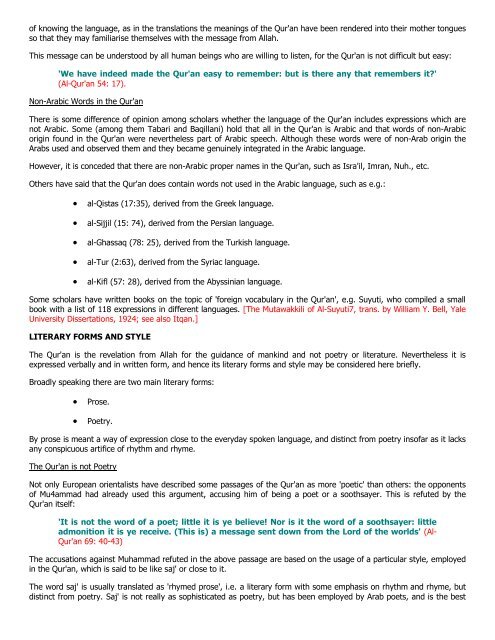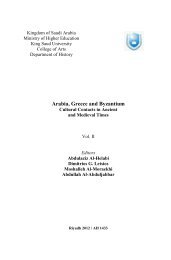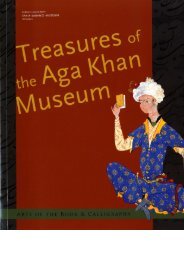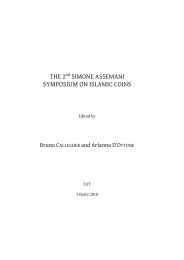ulum-al-quran
ulum-al-quran
ulum-al-quran
Create successful ePaper yourself
Turn your PDF publications into a flip-book with our unique Google optimized e-Paper software.
of knowing the language, as in the translations the meanings of the Qur'an have been rendered into their mother tongues<br />
so that they may familiarise themselves with the message from Allah.<br />
This message can be understood by <strong>al</strong>l human beings who are willing to listen, for the Qur'an is not difficult but easy:<br />
'We have indeed made the Qur'an easy to remember: but is there any that remembers it'<br />
(Al-Qur'an 54: 17).<br />
Non-Arabic Words in the Qur'an<br />
There is some difference of opinion among scholars whether the language of the Qur'an includes expressions which are<br />
not Arabic. Some (among them Tabari and Baqillani) hold that <strong>al</strong>l in the Qur'an is Arabic and that words of non-Arabic<br />
origin found in the Qur'an were nevertheless part of Arabic speech. Although these words were of non-Arab origin the<br />
Arabs used and observed them and they became genuinely integrated in the Arabic language.<br />
However, it is conceded that there are non-Arabic proper names in the Qur'an, such as Isra'il, Imran, Nuh., etc.<br />
Others have said that the Qur'an does contain words not used in the Arabic language, such as e.g.:<br />
<br />
<br />
<br />
<br />
<br />
<strong>al</strong>-Qistas (17:35), derived from the Greek language.<br />
<strong>al</strong>-Sijjil (15: 74), derived from the Persian language.<br />
<strong>al</strong>-Ghassaq (78: 25), derived from the Turkish language.<br />
<strong>al</strong>-Tur (2:63), derived from the Syriac language.<br />
<strong>al</strong>-Kifl (57: 28), derived from the Abyssinian language.<br />
Some scholars have written books on the topic of 'foreign vocabulary in the Qur'an', e.g. Suyuti, who compiled a sm<strong>al</strong>l<br />
book with a list of 118 expressions in different languages. [The Mutawakkili of Al-Suyuti7, trans. by William Y. Bell, Y<strong>al</strong>e<br />
University Dissertations, 1924; see <strong>al</strong>so Itqan.]<br />
LITERARY FORMS AND STYLE<br />
The Qur'an is the revelation from Allah for the guidance of mankind and not poetry or literature. Nevertheless it is<br />
expressed verb<strong>al</strong>ly and in written form, and hence its literary forms and style may be considered here briefly.<br />
Broadly speaking there are two main literary forms:<br />
<br />
<br />
Prose.<br />
Poetry.<br />
By prose is meant a way of expression close to the everyday spoken language, and distinct from poetry insofar as it lacks<br />
any conspicuous artifice of rhythm and rhyme.<br />
The Qur'an is not Poetry<br />
Not only European orient<strong>al</strong>ists have described some passages of the Qur'an as more 'poetic' than others: the opponents<br />
of Mu4ammad had <strong>al</strong>ready used this argument, accusing him of being a poet or a soothsayer. This is refuted by the<br />
Qur'an itself:<br />
'It is not the word of a poet; little it is ye believe! Nor is it the word of a soothsayer: little<br />
admonition it is ye receive. (This is) a message sent down from the Lord of the worlds' (Al-<br />
Qur'an 69: 40-43)<br />
The accusations against Muhammad refuted in the above passage are based on the usage of a particular style, employed<br />
in the Qur'an, which is said to be like saj' or close to it.<br />
The word saj' is usu<strong>al</strong>ly translated as 'rhymed prose', i.e. a literary form with some emphasis on rhythm and rhyme, but<br />
distinct from poetry. Saj' is not re<strong>al</strong>ly as sophisticated as poetry, but has been employed by Arab poets, and is the best





